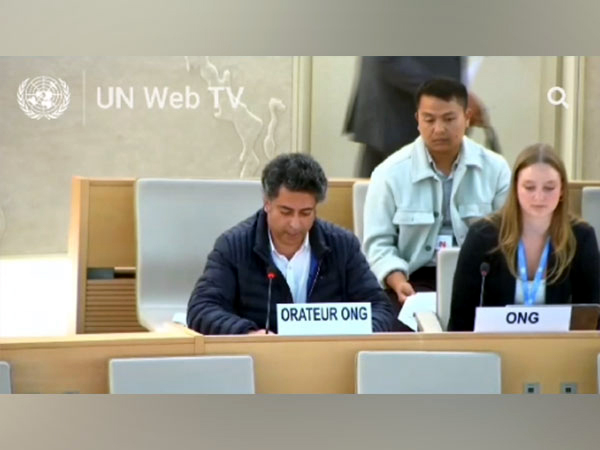Geneva [Switzerland], Oct 9: Senior Kashmiri Journalist and author Khalid Jehangir during his intervention at the 54th Session of the United Nations Human Rights Council (UNHRC) reiterated that Pakistan continues to support cross-border terrorism in India’s Jammu and Kashmir.
Jehangir, who is also the president of the International Centre for Peace Studies (ICPS), said, “Pakistan-sponsored cross-border terrorism has long affected J-K. Pakistan’s involvement in cross-border terrorism within the confines of J-K is unequivocally demonstrated through the contents of New Delhi’s annual report for the year 2022. The Ministry of External Affairs of India has articulated that Pakistan remains steadfast in its sponsorship of cross-border terrorism against India, thereby resulting in perturbations in trade dynamics and interconnections. The report further accentuates the sustained instances of cross-border terrorism, infiltration, and the illicit transportation of contraband across the territorial boundaries of Kashmir.”
“I stand as a representative of the aggrieved, embodying the muted voices ensnared within the tumultuous web of Pakistan’s trans-boundary terrorism impinging upon the domain of J-K. My role obliges me to underscore the profundity of the ramifications imposed on the milieu of human rights. Over the course of time, the populace indigenous to Jammu and Kashmir has ardently aspired for a state of serenity and an exercise of self-sovereignty, aspirations that are persistently marred by the recalcitrant predilection of Pakistan to foment an atmosphere characterized by violence. The collateral consequences of this predilection are manifest in the irreparable loss of life, disintegration of familial units, and the pervasive instillation of trepidation within the local populace,” he added.
Jehangir further said that the modus operandi employed by these cross-border terrorists subvert the fundamental tenets of free speech and unrestrained expression, adding that the comprehensive execution of the Universal Periodic Review (UPR) pertaining to the human rights landscape of Pakistan is a fundamental imperative.
“The modus operandi employed by these cross-border terrorists not only exemplifies a reprehensible character but also transgresses the sanctity of the human rights inherent to the residents of J-K. Perpetrations such as explosive ordnance deployment and firearm engagements engender indelible detriments, corroding the fabric of security and overall well-being. Beyond the scope of physical violence, these tactical maneuvers subvert the fundamental tenets of free speech and unrestrained expression. Journalists, activists, and ordinary citizens who dare to articulate dissenting narratives are confronted with tactics of intimidation, thereby resulting in the truncation of their discursive prerogatives,” he said.
Jehangir added, “The comprehensive execution of the Universal Periodic Review (UPR) pertaining to the human rights landscape of Pakistan is a fundamental imperative. Collectively, let us lend resonance to the voices of the afflicted and vociferously demand justice. The pursuit should be directed towards cultivating a milieu in J-K wherein its progeny may burgeon devoid of the specter of terror, and wherein human rights are not relegated to mere platitudes but rather constitute a palpable verity. Let the international fraternity unanimously censure Pakistan’s predilection for transboundary terrorism within the precincts of J-K and confront this quandary with an unwavering tenacity.”
On the sidelines of the Council, Jehangir also met academicians, diplomats and activists from different countries and apprised them about the present situation in J-K and the attempts of Pakistan to create uncertainty and chaos in the region. (Agencies)
Home Latest News “Pakistan Steadfast In Supporting Cross Border Terrorism,” Says Kashmiri Journalist


